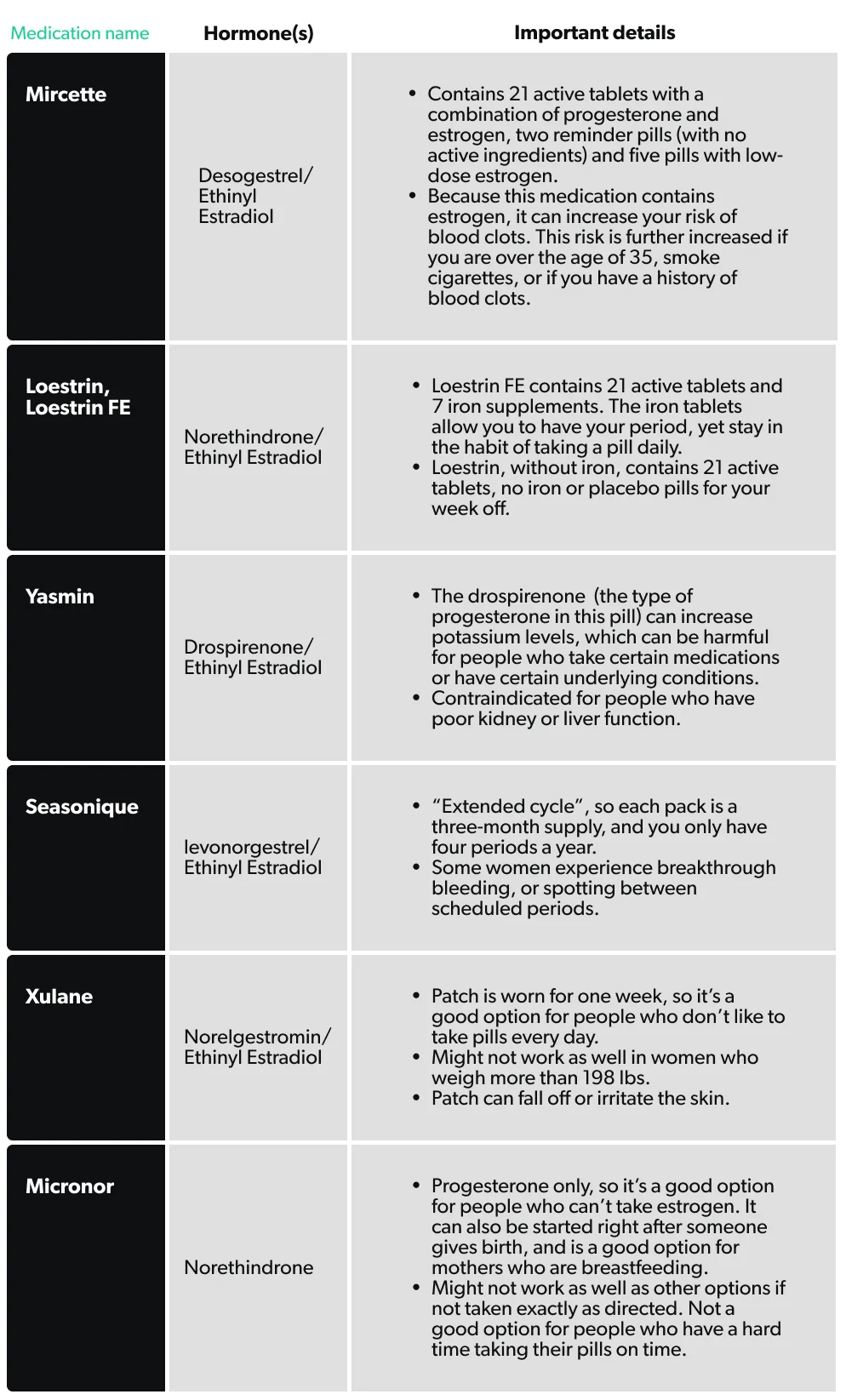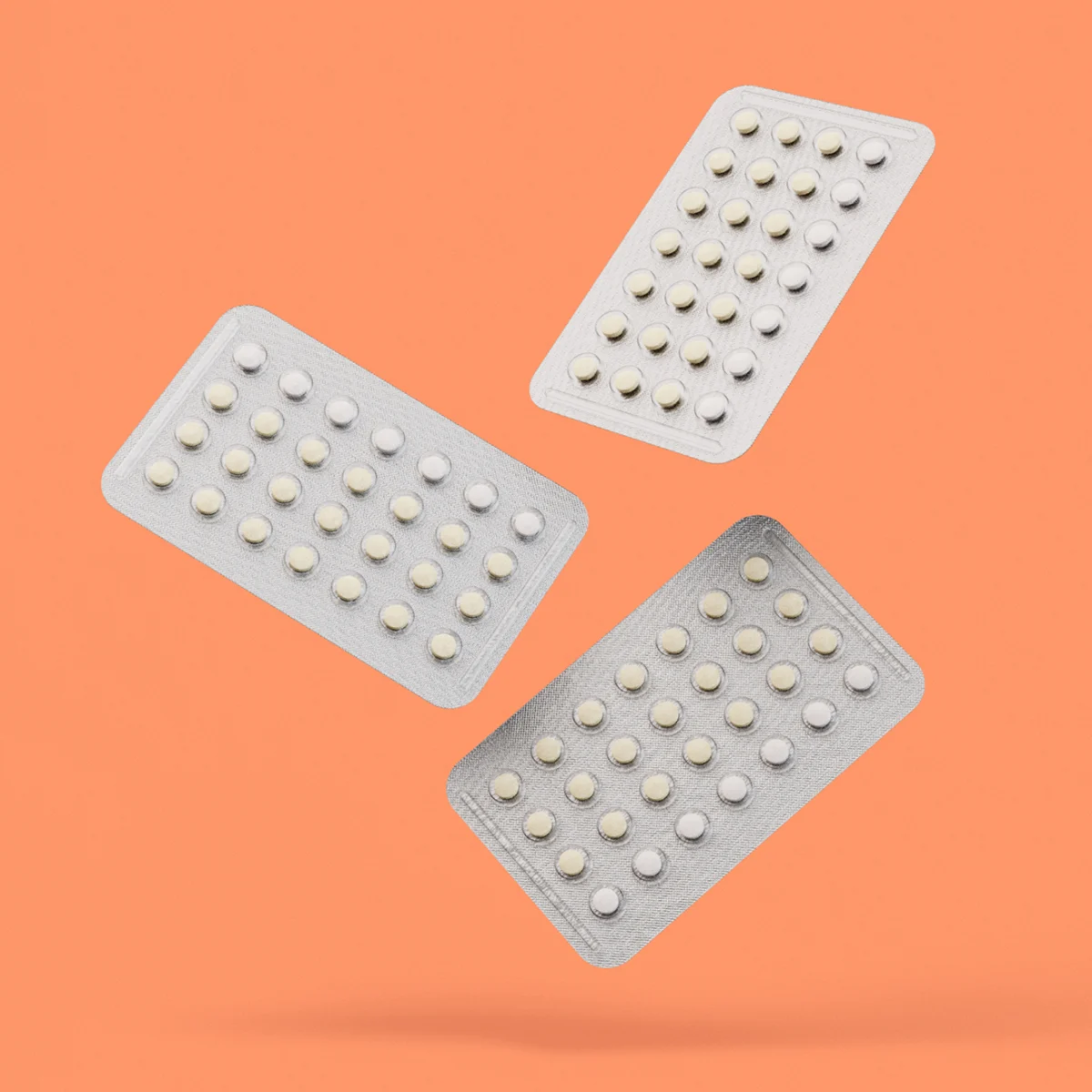Mylan birth control: uses, side effects, and interactions

Reviewed by Yael Cooperman, MD, Ro,
Written by Hope Chang, PharmD
last updated: Mar 20, 2021
3 min read
Here's what we'll cover
Tucked away in the corner of a colorfully packaged birth control box you have seen the word Mylan.
Mylan isn’t a type of birth control, though. It’s a pharmaceutical company that makes brand-name and generic medications—including birth control. The hormonal contraceptives that Mylan currently makes come in a pill or patch form, and contain varying amounts of progestin and estrogen. Let’s take a look at the options and see how they compare.
Which Mylan birth control is right for me?
Mylan currently has seven different types of birth control on the market. As far as effectiveness is concerned, any birth control pill or patch is over 99% effective at preventing pregnancy when used as directed (Trussell, 2011).
Birth control pills usually differ in the amount of progesterone and estrogen they contain. Progesterone and estrogen are hormones that play a crucial role in ovulation (which is when your ovaries release an egg) and your menstrual cycle. The levels of these hormones naturally rise and fall throughout your cycle but by keeping them consistent throughout the month, you can prevent your ovaries from releasing an egg to prevent ovulation and pregnancy (Allen, 2020).
Mylan makes progestin-only pills like Micronor, which can be a good option for people who can’t or don’t want to take estrogen. There are also extended-cycle oral contraceptives available, such as Seasonique, that result in less frequent periods. Other birth control pills from Mylan include Mircette, Yasmin, Loestrin, and Loestrin FE. For people who don’t like taking pills every day, Mylan also makes the Xulane patch, which only needs to be changed once a week.

Side effects and risks of Mylan birth control
Except for progesterone-only tablets (Micronor), Mylan birth control options all contain progestin and estrogen—and have similar side effects. Common side effects include:
Bloating
Cramps
Breast tenderness
Nausea or vomiting
Weight changes (increase or decrease)
Menstrual bleeding-related side effects (breakthrough bleeding, spotting, heavier or lighter periods, and loss of period)
The use of oral contraceptives can also worsen cholesterol, blood sugar, and blood pressure and may not be a good option for people with high cholesterol, diabetes, and hypertension (NIH, 2017).
Lastly, there are serious warnings about the risk of smoking cigarettes while using certain contraceptives. For example, combination oral contraceptives can increase the risk of severe problems—like blood clots, heart attack, or stroke—and the risk jumps up even more in people who smoke, especially if they are over the age of 35.
It’s important to share your full medical history and any underlying health conditions with a healthcare provider before taking any type of birth control to reduce the risk of side effects.
What’s better: brand name or generic birth control?
Generally speaking, brand name and generic birth control options are pretty much equal. So, what does that mean for a generic manufacturer like Mylan?
All generic manufacturers must submit an application to the FDA to show that the medication the company creates performs the same as any branded product (FDA, 2019). While generic drugs may differ in cost and how they look, all act the same way in your body—and have met the FDA’s rigorous approval standards (Uhl, 2018).
Almost all brand-name birth control products have a generic version. Generic drugs are a popular option, with one study finding that 82% of women in 2014 were prescribed generic oral birth control. While brand name and generic birth control products are equally safe and effective at preventing pregnancy, generic products are generally more affordable and are covered with no copay by many health plans (Chee, 2018).
In the end, it’s important to remember that all birth control medications, whether name brand or generic, have been found to be safe and effective by the FDA. Make sure you share your medical history with a healthcare provider, who can help you find a birth control method that meets your needs and unique lifestyle.
DISCLAIMER
If you have any medical questions or concerns, please talk to your healthcare provider. The articles on Health Guide are underpinned by peer-reviewed research and information drawn from medical societies and governmental agencies. However, they are not a substitute for professional medical advice, diagnosis, or treatment.
Allen, R. H. (2020). Combined estrogen-progestin oral contraceptives: Patient selection, counseling, and use. Retrieved March 23, 2021, from https://www.uptodate.com/contents/combined-estrogen-progestin-oral-contraceptives-patient-selection-counseling-and-use#H4171659430
Chee, M., Zhang, J., Ngooi, S., Moriates, C., Shah, N., & Arora, V. (2018). Generic substitution rates of oral contraceptives and Associated out-of-pocket cost savings Between January 2010 and December 2014. JAMA Internal Medicine, 178 (4), 561. Retrieved from https://www.ncbi.nlm.nih.gov/pmc/articles/PMC5876818/
Desogestrl and ethinyl estradiol and ethinyl estradiol kit [package insert]. Morgantown, WV: Mylan Pharmaceuticals; 2017. Retrieved from https://dailymed.nlm.nih.gov/dailymed/drugInfo.cfm?setid=142c4b90-c9ab-45ce-9172-f1ea7d366686
Drospireone and ethinyl estradiol kit [package insert]. Morgantown, WV: Mylan Pharmaceuticals; 2019. Retrieved from https://dailymed.nlm.nih.gov/dailymed/drugInfo.cfm?setid=25f9b952-cc1d-454e-a3ec-834ba1774b6b
Levonorgestrel and ethinyl estradiol kit [package insert]. Morgantown, WV: Mylan Pharmaceuticals; 2019. Retrieved from https://dailymed.nlm.nih.gov/dailymed/drugInfo.cfm?setid=e5eb2533-cc31-43a8-8fca-d46d72a59530
Norethindrone tablets [package insert]. Morgantown, WV: Mylan Pharmaceuticals; 2018. Retrieved from https://dailymed.nlm.nih.gov/dailymed/drugInfo.cfm?setid=8d81169e-63ef-4454-b203-561db1e4bf33
Norethindrone acetate and ethinyl estradiol tablets [package insert]. Morgantown, WV: Mylan Pharmaceuticals; 2017. Retrieved from https://dailymed.nlm.nih.gov/dailymed/drugInfo.cfm?setid=89948751-bd6e-4e9c-b87c-8782706c1097##
Norethindrone acetate and ethinyl estradiol kit [package insert]. Morgantown, WV: Mylan Pharmaceuticals; 2019. Retrieved from https://dailymed.nlm.nih.gov/dailymed/drugInfo.cfm?setid=4423eebd-6397-4330-85a8-baa2e736767a
Trussell J. (2011). Contraceptive failure in the United States. Contraception, 83 (5), 397–404. Retrieved from https://www.ncbi.nlm.nih.gov/pmc/articles/PMC3638209/
U.S. Food and Drug Administration (FDA). (2019, May 22). Abbreviated new drug application (anda): Generics. Retrieved February 16, 2021, from https://www.fda.gov/drugs/types-applications/abbreviated-new-drug-application-anda
Uhl, K., & Peters, J. R. (2018). How the FDA Ensures High-Quality Generic Drugs. American Family Physician, 97 (11), 696-697. Retrieved from https://www.aafp.org/afp/2018/0601/p696.html
Xulane patch [package insert]. Morgantown, WV: Mylan Pharmaceuticals; 2020. Retrieved from https://dailymed.nlm.nih.gov/dailymed/drugInfo.cfm?setid=f7848550-086a-43d8-8ae5-047f4b9e4382










